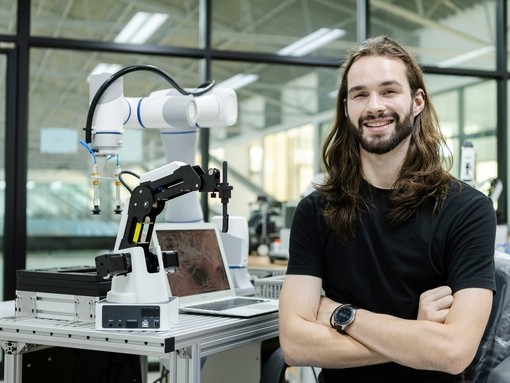
Embrace every kind of mind: a guide to creating neuro-inclusive working environments
Contents
- Here are some things that employers can do to support neurodiverse individuals:
- How to be an ally for neurodiverse team members
- Businesses that take steps now can unleash long-term potential benefits that enable their teams and their people to make an impact that matters. Hiring neurodiverse individuals can bring numerous benefits to a company, including:
Contents
Neurodiversity describes the amazing variety in human neurology, thinking, communication styles and expression. Those typically excluded are a wide spectrum of neurodivergent conditions, characteristics and expressions including conditions such as Autism Spectrum Condition, Attention Deficit Hyperactivity Disorder, Dyslexia, Dyscalculia, Developmental Language Disorder, and Dyspraxia.
15-20% of the world population is neurodivergent (rising sharply in STEM tertiary education). But it is within the neurodivergent population that lies one of the largest employment gaps. Taking autism as an example, just 22% of autistic people are reported to be in paid work. While not all autistic people can work, most want to. The Government and employers must improve the support and understanding of autistic people get to find and keep work.
Read on to find out how employers can embrace neurodiversity, how to be an ally and the positive contributions every kind of mind can make.

Creating a more inclusive workplace for neurodiverse individuals involves recognising and accommodating differences in how people process information, communicate and interact with others. Neurodiverse individuals have different needs and requirements than neurotypical individuals in the workplace.
Here are some things that employers can do to support neurodiverse individuals:
Accommodations: Provide accommodations that address the specific needs of neurodiverse individuals. These accommodations may include modifications to the work environment, such as providing noise-cancelling headphones, reducing sensory input, offering flexible work arrangements, allowing employees to work remotely or adjust their schedules, or work in a quieter area of the office. This can help to reduce stress and anxiety and increase productivity.
Adjust communication: Be aware of how you communicate with neurodiverse individuals, and adjust your communication methods to suit their needs. This may include using clear and direct language, avoiding idioms or sarcasm, and allowing for more time to process information or respond to questions.
Encourage open communication: Encourage open communication by creating a safe and respectful workplace culture where employees feel comfortable sharing their needs and concerns. This can help to foster a sense of trust and support within the team.
Feedback and support: Provide constructive feedback and support to help neurodiverse individuals improve their performance. This can help to build their confidence and improve their overall job satisfaction.
Sensitivity training: Offer sensitivity training to colleagues to help them understand the unique needs of neurodiverse individuals and how they can best support them in the workplace.
Equal opportunities: Neurodiverse individuals, like every employee regardless of race, gender or background, must have equal opportunities for advancement and promotion within the organisation. Equal opportunities must be understood, encouraged, celebrated and communicated at every level of your business.
Celebrate diversity: Celebrate diversity and promote a culture of inclusivity by recognising and valuing the unique strengths and contributions of all employees, regardless of their neurodivergent status. This can help to create a culture of inclusivity and promote a positive and supportive work environment.
By providing accommodations, clear communication, feedback and support, sensitivity training, equal opportunities, and celebrating diversity, employers can create a more inclusive workplace for neurodiverse individuals that fosters their strengths and allows them to thrive.
How to be an ally for neurodiverse team members
Allyship is an important part of building a welcoming and encouraging environment for neurodiverse team members. It’s a personal commitment, whether you’re a business leader, HR professional, manager or colleague, to support and stand up for someone who may experience discrimination or disadvantage. It also applies to supporting a group of people, such as the neurodiverse community.
Anyone can be an ally, but it’s not as simple as some encouraging feedback or small concessions. It requires personal reflection and development. To be an ally, you need to be aware of your personal bias and work on unlearning it. Take note of how you perceive things and put yourself in someone else’s shoes often. You could be surprised by how your perception changes.
You also have to recognise your privilege, and how your experience of the workplace might be easier than other colleagues or team members, due to circumstances outside their control. Use your voice to amplify the voices of those people or groups who aren’t being heard, and call out inequality or discrimination when you see it. Give them opportunities to have the same platform to speak as you do.
In the end, being an ally for neurodiverse team members is all about empathy. You should be seeking to understand their challenges in the workplace and asking yourself what can be done to make it better. Importantly, you should also be doing it on their terms, so gauge carefully what a neurodiverse colleague might be comfortable with and start with that introspection before all else.

Our goal is to improve the working lives of neurodivergent people, helping to unlock the unique and innovative contributions they can bring to companies, projects and society by providing pathways to employment for all and educating organisations on the potential of this underutilised talent pool. The stats show there is much work still to be done:
Only 16% of autistic adults are in full-time paid employment (National Autistic Society)
Neurodiversity at work is not on the agenda for 9 out of 10 employers (Workplace Insight)
45% of people have lost or left their job because of challenges caused by their neurodivergent status (National Autistic Society)
Businesses that take steps now can unleash long-term potential benefits that enable their teams and their people to make an impact that matters. Hiring neurodiverse individuals can bring numerous benefits to a company, including:
Unique perspectives: Neurodiverse individuals often have different ways of thinking, problem-solving, and approaching challenges, which can lead to fresh perspectives and innovative ideas.
Attention to detail: Many neurodiverse individuals have an exceptional ability to focus on details and identify patterns, which can be valuable in a variety of industries, such as technology, engineering, and finance.
Enhanced creativity: Neurodiverse individuals may have a heightened sense of creativity, which can lead to innovative solutions, products, and services.
Increased productivity: When provided with the right support and accommodations, neurodiverse individuals can be highly productive and efficient workers.
Loyalty and commitment: Neurodiverse individuals may have a strong sense of loyalty and commitment to their employer and may stay with a company for longer periods of time.
Diversity and inclusion: By hiring neurodiverse individuals, companies can foster a more inclusive workplace culture and demonstrate their commitment to diversity and equality.
Access to untapped talent: By expanding their recruitment efforts to include neurodiverse individuals, companies can tap into a talent pool that is often overlooked or underutilised.
Overall, hiring neurodiverse individuals can bring a range of benefits to a company, including increased innovation, productivity, and diversity, as well as access to untapped talent.
By creating an inclusive workplace culture that values neurodiversity, companies can attract and retain a diverse and talented workforce, foster a positive reputation, and demonstrate their commitment to diversity and equality. Neurodiverse individuals bring unique skills, perspectives, and creativity to the workplace, which can enhance innovation, productivity, and overall success. Additionally, neurodiverse individuals can benefit from increased job opportunities, greater job satisfaction, and improved quality of life.
By embracing neurodiversity, businesses and individuals can both thrive and contribute to a more inclusive and equitable society.
If you would like to find out more about how you can attract and retain neurodiverse talent don’t hesitate to get in touch with our team of experts here. Or, ready to take the first or next step into a career, search our latest opportunities.
Anxious about your job search?Read our article on how to minimise job search anxiety
Contents
- Here are some things that employers can do to support neurodiverse individuals:
- How to be an ally for neurodiverse team members
- Businesses that take steps now can unleash long-term potential benefits that enable their teams and their people to make an impact that matters. Hiring neurodiverse individuals can bring numerous benefits to a company, including:





